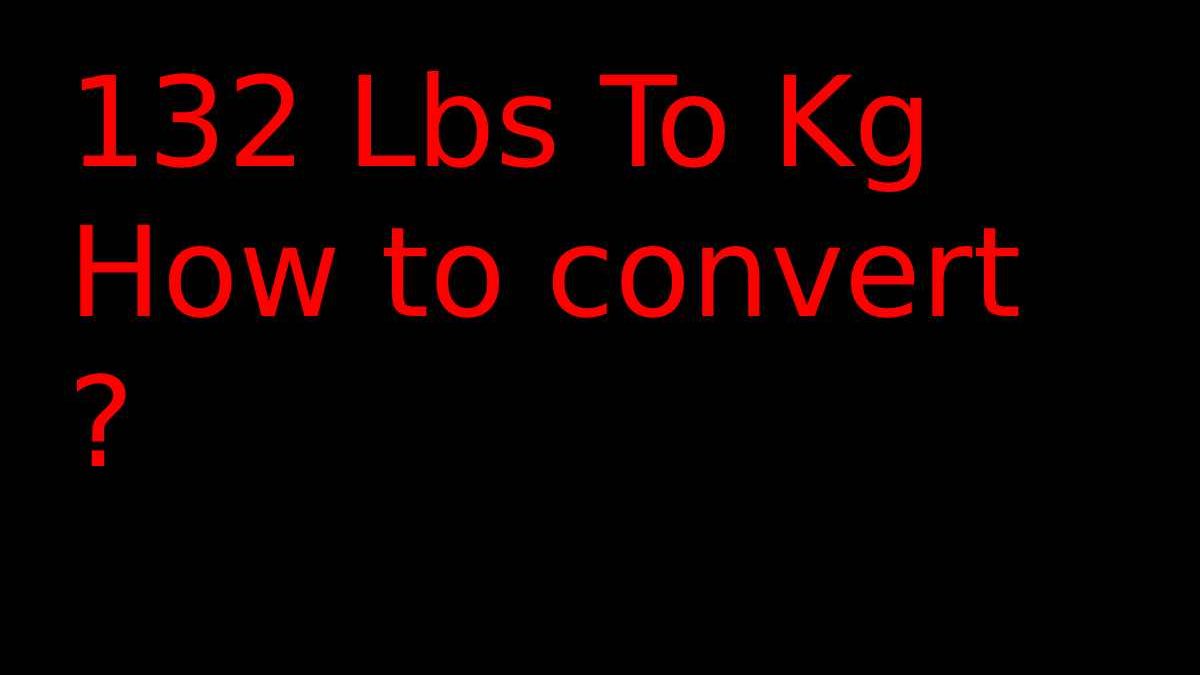Table of Contents
Calculate lbs From Kg
132 Lbs To Kg -To calculate pounds from kilograms, you can increase the kg value by about 2.2 to get an approximate value.
If you want to be precise, you can multiply with 2.20462262185, but 2.2 is mostly pretty close.
To make this much more accessible, use the following converter to change kilograms in pounds:
The kilogram is the unit of mass (metric), the current definition of the International Units (SI) of the kilogram, officially recognized by the International Committee on Weights and Measures (D1), is the mass of the international prototype kilogram. It is the mass of this unique prototype artefact “immediately after purification by a prescribed technique”. The book is the international book Avirordupois of 0.453592 kilograms. It is the unit of mass in the imperial,
The US.
The answer is: 132 lb = 59.8742 kg
LBS formula in kg:
It’s easy to use and write metric units once you know how it works. It’s simple and logical and consists of units and prefixes.
1 book (lb) = 0.453592 kg
Example: You want to change 10 pounds to kg
Depending on the formula -> 10 lb = 4.53592 kg
What Converts 132 lbs To Kg? Learn The Answer To This Change Or Try Our Easy-To-Use Calculator To Convert An LBS Value To Kg With The Exact Results.
132 pounds (lb) = 59,874 kilograms (kg)
Books (lb) to Kilograms (kg) Conversion Equations
It’s easy to turn books into kilograms! You can use any of the following change equations to convert LBS to KG:
Lbs ÷ 2.20462 = kg
or then
Lb x 0.453592 = kg
Example 132 Lbs To Kg:
132 pounds ÷ 2.20462 = 59,874 kg
Convert 132 lbs To kg Other Weight Units
Now that he’s converted 132 pounds to kg, he might want to convert the pounds to other units. Here are some other useful conversions from books to common units of length:
Unit 132 (LBs) in different units
(MT) 0.06 TM
Grams (g) 59 874.144 g
Milgram (Mg) 59,874,144 mg
Imperial ton (t) 0.059 t
US Clay (t) 0.066 t
Stone (St.) 9,429 St.
Once (oz) 2,112 oz
History Of The Kilogram (Kg)
Since there was no single unit of measure in the late 18th century, merchants constantly enticed their customers to change quantities. It was then that the King of France, Louis XVI, decided to act. The king ordered his authorities to create a unified weighting system that could not be changed and must use by all merchants in the country. The first metric decimal system, called the tomb, came about. This system was designed for the mass of one litre of water when it reaches its freezing point.
This revolutionary metric system was prevalent and soon after, what was called a “grave” became a “gram”. The Gram corresponded to the mass of 1 cm3 of water near the freezing point. While accurate, the Gram wasn’t efficient for commercial use and had to replace with something more significant. That’s when they decided to grow the weight of a gram and create another unit of measurement. It is how the kilogram appeared. In 1799, the entire republic adopted the kilogram as the standard unit of measure, and it quickly became famous around the world.
History Of The Lbs
The pound has a more multifaceted history and has undergone significant changes. It was first created in ancient times and was known as the “Roman pound”. The scale was approximately 328.9 grams and divided into 12 ounces. It is also the reason for the abbreviation “lb”. The definition of the pound began in the United Kingdom, but it was a long process, and its actual mass changed often. With this in mind, the Troy pound, Tower pound, and Wool pound were vastly different, and all served other purposes. The standard pound enacted by an Act of the British Parliament in 1878 is the version of the pound we use today.
Convert Kilograms (Kg) To Pounds (Lbs) And Vice Versa
The equivalence of the pound to the kilogram establish in the 1878 Act. It was an excellent measure as it allowed international merchants to exchange their items no matter what standard unit they used. According to the law, 1 kilogram equals 2.20462262 pounds. The law also gives the mass of a pound in kg, and 1 pound equals 0.45359237 kilograms.
Conclusion
The creation of the pound (lb) and the kilogram (kg) revolutionized today’s world. The fact that we still use these units of measurement today shows us how useful they are and how we can still benefit from something developed over 200 years ago.


